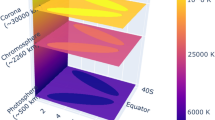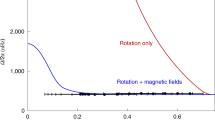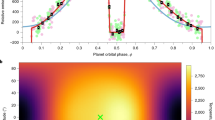Abstract
ALTERNATIVE theories1 that seek to explain the mechanism of the selective emission forming the principal component of the night–sky spectrum postulate solar excitation as the primary cause. On this premise the initial ionization of the gas molecules (O2, N2) that are known to exist in the terrestrial high atmosphere is effected either by direct absorption of ultra–violet radiation, or by bombardment with high–speed electrons presumably emitted from the photospheric layers.
This is a preview of subscription content, access via your institution
Access options
Subscribe to this journal
Receive 51 print issues and online access
$199.00 per year
only $3.90 per issue
Buy this article
- Purchase on Springer Link
- Instant access to full article PDF
Prices may be subject to local taxes which are calculated during checkout
Similar content being viewed by others
References
Chapman, S., Phil. Mag., 23, 657 (1937); Dauvillier, A., Rev. gén. d'élect., 31, 303, 443, 477 (1932).
Chapman, S., NATURE, 121, 989 (1928).
Lord Rayleigh and Jones, H. S., Proc. Roy. Soc. A, 151, 22 (1935).
Pub. Ast. Soc. Pac., 52, 319 (1940).
Lick Obs. Bull., 505 (1941), in the Press.
Author information
Authors and Affiliations
Rights and permissions
About this article
Cite this article
BARBER, D. LIGHT OF THE NIGHT SKY AND TERRESTRIAL MAGNETISM. Nature 148, 88–89 (1941). https://doi.org/10.1038/148088a0
Issue Date:
DOI: https://doi.org/10.1038/148088a0
Comments
By submitting a comment you agree to abide by our Terms and Community Guidelines. If you find something abusive or that does not comply with our terms or guidelines please flag it as inappropriate.



